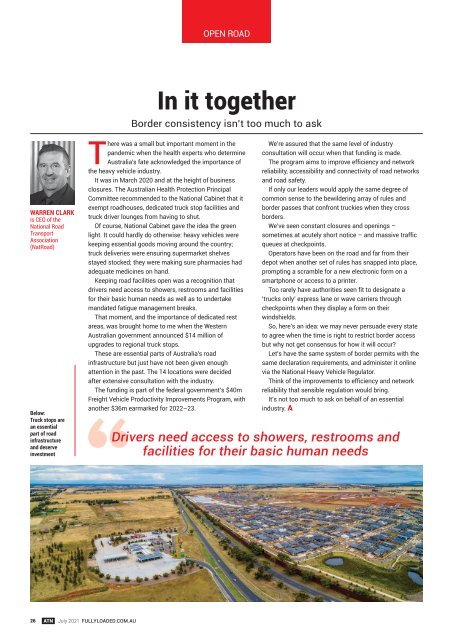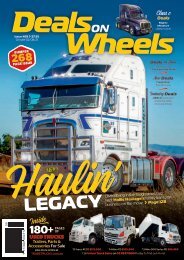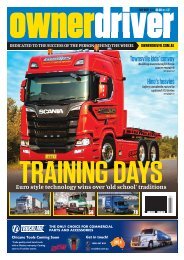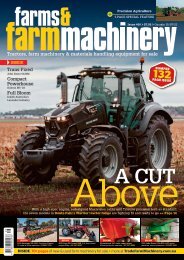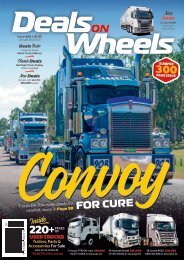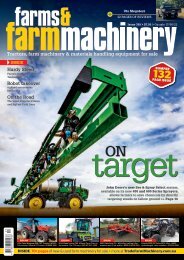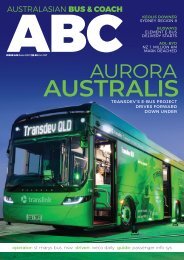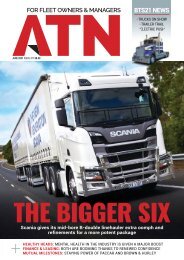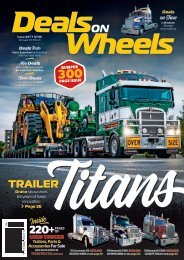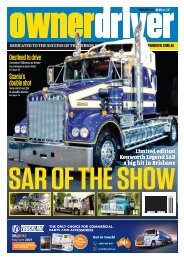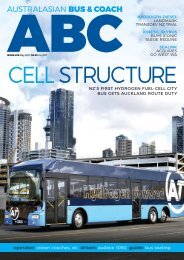Create successful ePaper yourself
Turn your PDF publications into a flip-book with our unique Google optimized e-Paper software.
OPEN ROAD<br />
In it together<br />
Border consistency isn’t too much to ask<br />
WARREN CLARK<br />
is CEO of the<br />
National Road<br />
Transport<br />
Association<br />
(NatRoad)<br />
Below:<br />
Truck stops are<br />
an essential<br />
part of road<br />
infrastructure<br />
and deserve<br />
investment<br />
There was a small but important moment in the<br />
pandemic when the health experts who determine<br />
Australia’s fate acknowledged the importance of<br />
the heavy vehicle industry.<br />
It was in March 2020 and at the height of business<br />
closures. The Australian Health Protection Principal<br />
Committee recommended to the National Cabinet that it<br />
exempt roadhouses, dedicated truck stop facilities and<br />
truck driver lounges from having to shut.<br />
Of course, National Cabinet gave the idea the green<br />
light. It could hardly do otherwise: heavy vehicles were<br />
keeping essential goods moving around the country;<br />
truck deliveries were ensuring supermarket shelves<br />
stayed stocked; they were making sure pharmacies had<br />
adequate medicines on hand.<br />
Keeping road facilities open was a recognition that<br />
drivers need access to showers, restrooms and facilities<br />
for their basic human needs as well as to undertake<br />
mandated fatigue management breaks.<br />
That moment, and the importance of dedicated rest<br />
areas, was brought home to me when the Western<br />
Australian government announced $14 million of<br />
upgrades to regional truck stops.<br />
These are essential parts of Australia’s road<br />
infrastructure but just have not been given enough<br />
attention in the past. The 14 locations were decided<br />
after extensive consultation with the industry.<br />
The funding is part of the federal government’s $40m<br />
Freight Vehicle Productivity Improvements Program, with<br />
another $36m earmarked for 2022–23.<br />
We’re assured that the same level of industry<br />
consultation will occur when that funding is made.<br />
The program aims to improve efficiency and network<br />
reliability, accessibility and connectivity of road networks<br />
and road safety.<br />
If only our leaders would apply the same degree of<br />
common sense to the bewildering array of rules and<br />
border passes that confront truckies when they cross<br />
borders.<br />
We’ve seen constant closures and openings –<br />
sometimes at acutely short notice – and massive traffic<br />
queues at checkpoints.<br />
Operators have been on the road and far from their<br />
depot when another set of rules has snapped into place,<br />
prompting a scramble for a new electronic form on a<br />
smartphone or access to a printer.<br />
Too rarely have authorities seen fit to designate a<br />
‘trucks only’ express lane or wave carriers through<br />
checkpoints when they display a form on their<br />
windshields.<br />
So, here’s an idea: we may never persuade every state<br />
to agree when the time is right to restrict border access<br />
but why not get consensus for how it will occur?<br />
Let’s have the same system of border permits with the<br />
same declaration requirements, and administer it online<br />
via the National Heavy Vehicle Regulator.<br />
Think of the improvements to efficiency and network<br />
reliability that sensible regulation would bring.<br />
It’s not too much to ask on behalf of an essential<br />
industry.<br />
Drivers need access to showers, restrooms and<br />
facilities for their basic human needs<br />
26 <strong>ATN</strong> July 2021 FULLYLOADED.COM.AU


